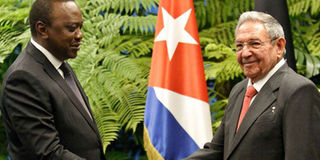Kenya can learn from Cuba how to raise more doctors

Cuban President Raul Castro (right) receives Kenya's President Uhuru Kenyatta at the Revolution Palace in Havana, on March 15, 2018. Cuba has dispatched specialist doctors to more than 70 countries. PHOTO | ERNESTO MATRACUSA | AFP
What you need to know:
- Cuba shows that when you develop an impeccable system of expertise, it is possible to earn foreign exchange.
- We need the right people to drive the health agenda. Those entrusted must demonstrate intellectual rigour, moral assiduity and true national pride.
Folks recently got frenetic with news that the state is sourcing 100 specialist doctors from Cuba.
To critics the move defied logic; Kenya is brimming with jobless medics, they reasoned.
But the brouhaha aside, in any case, this number is a drop in the ocean.
Picture this: At one time, Cuba supplied Venezuela with 30,000 doctors in the famous “Doctors-for-oil deal”.
Recently, Cuba sent about 5,000 doctors to Brazil who were deployed to slums and deep in the Amazon.
From the Brazilian deal, Cuba earned $270 million (Sh27bn) per year.
HEALTHCARE
Besides, Cuba has dispatched specialist doctors to more than 70 countries, especially to complex disaster outposts.
In turn, Cuba has made capital — prestige, goodwill and foreign exchange - out of this ingenuity that started as a strong ideological imperative towards nation building.
It was in Fidel Castro’s strong persuasion that the health of the individual is the health of the state.
Universal health became one of the drivers of his revolutionary ideals.
From thence, he established an elaborate medical model geared towards prevention reaching every nook and cranny of the Caribbean nation.
LESSONS
Then, Cuba provided some of the best training producing pedigree personnel, and encouraged research in medicine.
Parallel to developing the home-grown solutions, Castro made spectacular outreach to disaster prone areas such Haiti, Chile and even to Africa like latest Ebola outbreak.
Thus, what should be exciting our discourses and jolting our wits is how Cuba managed this epic feat and what lessons that our country can learn.
For instance, medical benevolence, Cuba’s gift to the world if you will, has become a strong source of soft power.
So important it is that Cuba’s medical diplomacy is even anchored appropriately in its foreign policy.
PROFIT
And the goodwill accrued has appropriately paid off. Cuba has enjoyed sympathy and accolades internationally based on this concept.
Indeed, scholars of international relations attribute the robust medical concept to have afforded Cuba buoyance amid US-designed and propagated economic sanctions.
This Cuban success story demonstrates how a leader’s strong ideological predisposition nuanced with benevolence can turn around a country’s fortunes.
It also debunks the myth that money is everything; instead strategic thinking is key to deliver a meaningful programme.
Further, Cuba shows that when you develop an impeccable system of expertise, it is possible to earn foreign exchange.
UHURU VISIT
That is why it was plausible when the government made a pilgrimage to Cuba and negotiated for specialist doctors and for ours to receive training.
But beyond getting the medical expertise, Kenya should also carefully understudy the Cuban model. Attitudinal change towards healthcare is key.
No doubt, ours is a broken health system. Thus to succeed, our system will call for a radical overhaul - in thought, attitude, structure and equipment.
System reconfiguration must pay heed to sound model of training, the spread and state of facilities in public hospitals, and financing.
In this new mix, it should not be lost on us that the gift of Information and communications technology can go along way in delivering quality through telemedicine.
CHANGE
We also need robust policies that will support and strictly monitor non-state actors in health.
The moral and ethical foundations of the health sector in this country are on quicksand as negligence, indifference and pursuit of money reigns supreme.
Good people, we cannot boast of Cuba’s medical diplomatic prowess when we still chisel out the wrong craniums, allow patients to die in ambulances, or force insurance card holders to undergo caesarean. This insanity must be tamed.
Thus to birth a system of Cuba’s eminence, ours needs a radical departure from the past.
We need the right people to drive the health agenda. Those entrusted must demonstrate intellectual rigour, moral assiduity, mettle, compassion, and true national pride.
We cannot thrive in a swamp of mediocrity and pilfering.
Mr Wamanji is Communication and Public Relations adviser. [email protected] Twitter: @manjis





